poll.Gallup.com
by Frank Newport
March 3, 2006
GALLUP NEWS SERVICE
PRINCETON, NJ -- President George W. Bush's job approval rating is now at 38%, while his disapproval rating is at 60%. These new ratings show a slight deterioration from early February. They are roughly equal to ratings from last November, which in turn were the lowest of his administration so far. Bush's job approval rating on handling terrorism -- long his greatest perceived strength -- is at 47%, by one point the lowest of his administration.
The CNN/USA Today/Gallup poll was conducted Feb. 28 to March 1.
The new job approval rating for Bush is within one point of the lowest of his administration: a 37% approval measured in mid-November of last year. Bush's net job approval rating (percentage approving minus percentage disapproving) is now at -22 points. That too is within one point of being the lowest of the Bush administration, after the 37% approve/60% disapprove measure of last November.
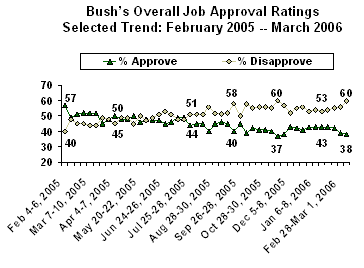
The long-term trend in Bush's job approval rating shows a gradual decline since the beginning of his second term in January 2005 (and, of course, a decline from his all-time high approval rating of 90%, measured in September 2001). Bush averaged a 52% rating in January 2005, and on a month-by-month basis, the rating has edged down since that time.
To date, Bush's worst month of his second term was November 2005, when his job approval averaged 38%. He rallied modestly in December, to an average of 42%, which was sustained in January of this year.
The three Gallup surveys conducted in February (the last of which includes interviews conducted on March 1) give Bush a February average approval rating of 40%, just ahead of where he was last November, but with a slight downward trend as the month of February has progressed.
Here is a comparison of Bush's February 2006 average to the job approval ratings of other presidents in February or March of the second year after they were re-elected.
|
President |
Month |
Approval |
Disapproval |
|
% |
% |
||
|
Truman |
February 1950 |
37 |
44 |
|
Eisenhower |
February 1958 |
54 |
33 |
|
Johnson |
February 1966 |
56 |
34 |
|
Nixon |
February 1974 |
27 |
62 |
|
Reagan |
March 1986 |
63 |
26 |
|
Clinton |
February 1998 |
66 |
30 |
|
George W. Bush |
February 2006 |
40 |
57 |
Two presidents had lower approval ratings than Bush in February of the second year after being re-elected: Truman and Nixon. Nixon, of course, went on to resign in August 1974 after reaching an approval rating as low as 24%. Truman reached the lowest job approval rating Gallup has ever recorded, 23%, in November 1951 and again in January 1952.
Approval on Selected Issues
The current poll measures Bush's job performance across four issue areas: the economy, Iraq, healthcare policy, and terrorism. Bush's approval rating on terrorism is the only one of these four that is now at the low point of his administration.
Bush's rating on handling the economy -- at 40% -- has remained stable across the last several months, and is slightly higher than was measured last fall.
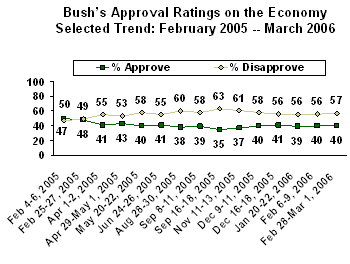
Bush's job approval rating on handling the situation in Iraq is at 35%, while disapproval is at 64%. This marks a slight drop from measures in January and February, and in December of last year, but is not Bush's all-time low on this measure. He received a 32% approval rating on Iraq last September.
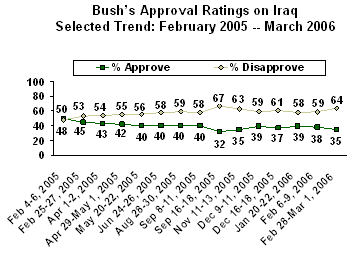
Bush's rating on handling healthcare policy is very low at 30%, continuing a series of low ratings on this dimension. The current 30% approval is slightly higher than Bush's low point of 27% in early February.
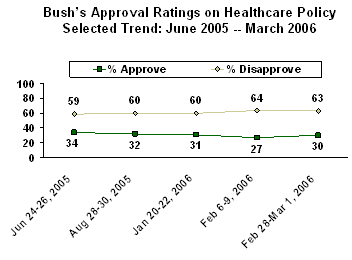
Bush's current job approval rating on handling terrorism is by one point the lowest Gallup has measured.
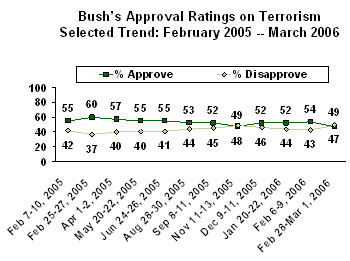
Terrorism has long been Bush's greatest strength, and it is notable that the current 47% approval is still higher than his approval on any of the other issue areas, and nine points higher than his overall approval rating.
Still, the fact that the president's terrorism rating has fallen below 50%, and is at the low point of his administration, suggests that the recent Dubai port controversy may be hurting his image on national security and fighting terrorism.
Survey Methods
Results are based on telephone interviews with 1,020 national adults, aged 18 and older, conducted Feb. 28-March 1, 2006. For results based on the total sample of national adults, one can say with 95% confidence that the maximum margin of sampling error is ±3 percentage points. In addition to sampling error, question wording and practical difficulties in conducting surveys can introduce error or bias into the findings of public opinion polls.
Commentary: